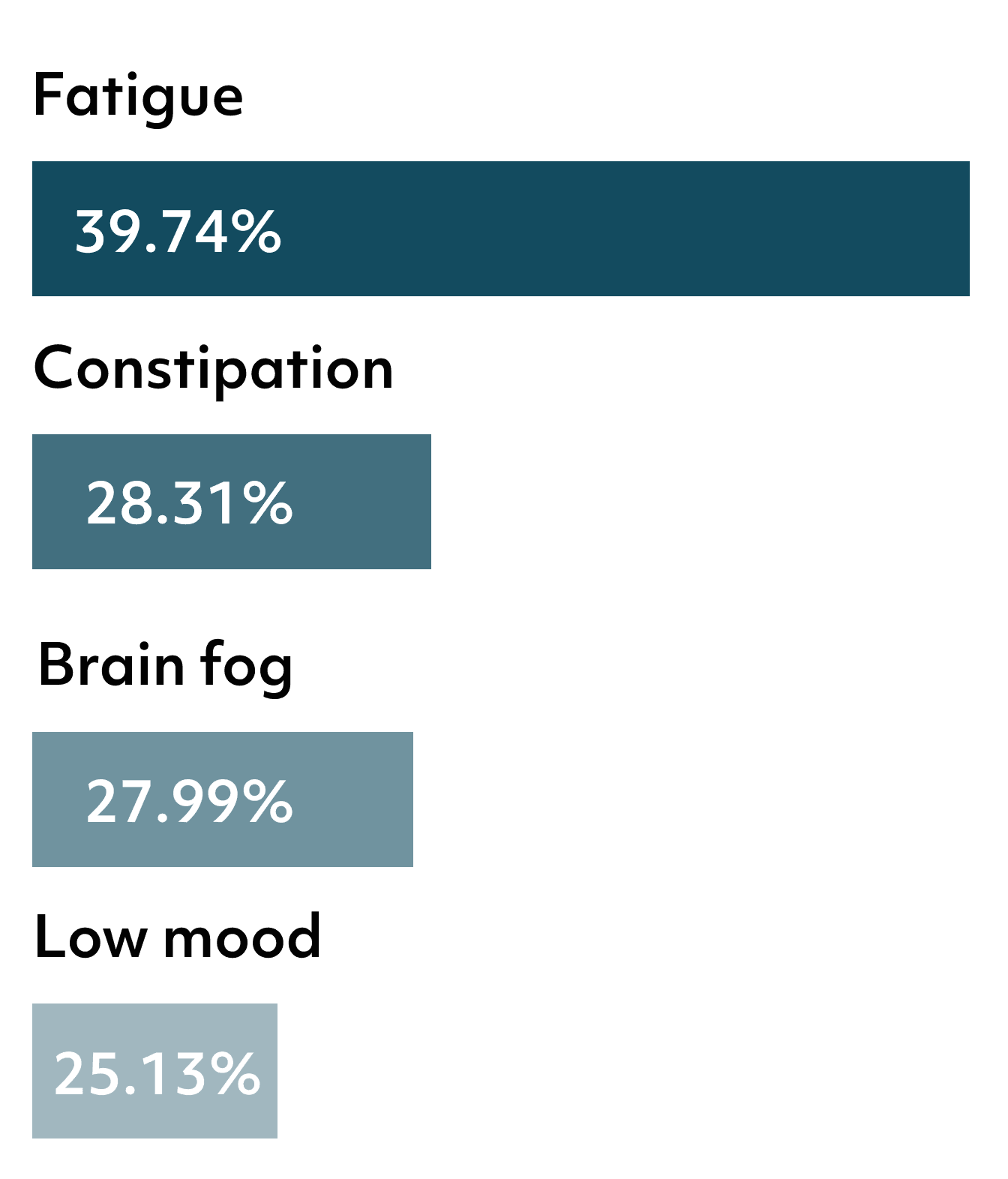Your results

This pie chart represents the 14-25% of women of reproductive age who have irregular menstrual cycles (1). As you can see, you’re far from alone.
Making sense of your symptoms
Irregular periods are often accompanied by symptoms that can make it feel like your body is malfunctioning. Here are the most common ones reported to us at Bloomful:

Percentage of respondents with irregular periods who experience each of these symptoms.
Fatigue
Our menstrual cycle is impacted by hormonal imbalances. These imbalances can be caused by a number of things, from heightened stress to a condition called polycystic ovary syndrome (PCOS). 70% of women with PCOS are insulin resistant (2), which can lead to fatigue. Other reasons you may have irregular periods and fatigue include nutrient deficiencies and an under-active thyroid. Hypothyroidism is when your thyroid gland doesn’t make enough hormones to regulate your weight, temperature and energy levels (among other things).
Constipation
Progesterone is often the hormonal culprit behind constipation. As its levels spike each month following ovulation, it can cause the digestive system to slow down, which leads to constipation. Irritable bowel syndrome can also make it hard to pass stools. This condition is often present in people who have PCOS. A less common cause of constipation is a fibroid (non-cancerous growth) that develops in the back of the uterus and presses down on the colon.
Brain fog
Feeling foggy is also associated with low levels of thyroid hormones and with PCOS. Cortisol, testosterone, oestrogen and progesterone are hormones associated with cognitive function so if your levels are fluctuating, this may lead to brain fog. Iron deficiency is another cause of fogginess (if you have both heavy and irregular periods, it’s important to check your iron levels).
Low mood
We touched on how hormones can impact our cognitive faculties; the same applies to mood. A study found that people with PCOS are about three times more likely to have a diagnosis of anxiety and depression (3), so a doctor may want to investigate whether your irregular periods and low mood point to this condition. A number of medications (including hormonal contraceptives) can also impact you cognitively and emotionally.

Be the first to access Bloomful’s clinic
We’re launching a virtual service to connect you to our team of expert gynaecologists. Our doctors will always hear you out and tailor their support to your unique circumstances.
Drop your email to be notified as soon as we’ve launched.

Should you be on red alert?
While irregular periods aren’t always a sign that something is wrong, they’re an important signal to tune into. We’ve covered some of the symptoms that can show up alongside them. Now let’s look at the possible causes:
Stress: When we feel threatened, worried, or under pressure, our body releases so-called stress hormones that can suppress our reproductive hormones, leading to irregular periods. This can also happen with extreme exercise - a form of stress on your body.
PCOS is a complex condition in which the ovaries produce high levels of the male sex hormone androgen. This can disturb ovulation and disrupt your menstrual cycle, leading to missed or irregular periods.
Hypothyroidism is when the thyroid gland doesn’t produce enough hormones to regulate functions such as your menstrual cycle.
Uterine polyps and fibroids are noncancerous growths that form within the uterus. In rare cases, they can become cancerous. These growths can interfere with your cycle in a few ways. For example, fibroids can stimulate the growth of blood vessels, which can increase the amount of blood you release during and outside of your period.
Infections such as pelvic inflammatory disease (PID) can cause inflammation of your reproductive organs and delay your periods.
Premature ovarian failure occurs when the ovaries don’t produce enough oestrogen or release eggs regularly.
Cervical erosion is when cells that normally line the inside of your cervix start growing on the outside of your cervix (the lower end of the uterus). These cells are more sensitive and can cause bleeding or spotting during or after sex. They can also lead to vaginal discharge that contains blood.
Menopause is when someone has gone 12 months without a menstrual period following a drop in oestrogen and progesterone. Periods can also become irregular during perimenopause, our body’s natural transition phase into menopause.
Prolactinoma is a non-cancerous tumour of the pituitary gland causing decreased levels of oestrogen and testosterone.
Gynaecological cancers, while rare, can cause bleeding between periods (intramenstrual bleeding) which may make it seem like your periods have become irregular.
(This list is here to educate and isn’t meant to be a diagnostic tool)

Where do you go from here?
Irregular periods can be hard to diagnose, partly due to a lack of awareness in the medical profession, and partly because gynae conditions are so complex and can often mimic each other (period cramps, for example, can be caused by both endometriosis and fibroids).
At Bloomful, we believe in empowering you with knowledge so that you can enter into conversations with medical professionals feeling like you speak the same language.
We've tailored the following reading list to help you on your journey:
PCOS and fertility: everything you need to know
Sign up for short, educational content to help your body thrive!
Want a redo?
Think you might have ticked the wrong boxes or have another symptom you want to check?
Citations
Abnormal uterine bleeding. Best Practice & Research Clinical Obstetrics & Gynaecology (Published: 2016. Authors: Whitaker, L., & Critchley)
Assessing impaired glucose tolerance and insulin resistance in Polycystic Ovarian Syndrome with a muffin test: Alternative to glucose tolerance test. (Published: 2010. Author: Ruth Freeman, Rena Pollack, Ella Rosenbloom)
Psychiatric disorders in women with polycystic ovary syndrome: a systematic review and meta-analysis. (Published: 2018. Authors: Claire Brutocao, Feras Zaiem, Mouaz Alsawas, Allison S Morrow, M Hassan Murad, Asma Javed)



